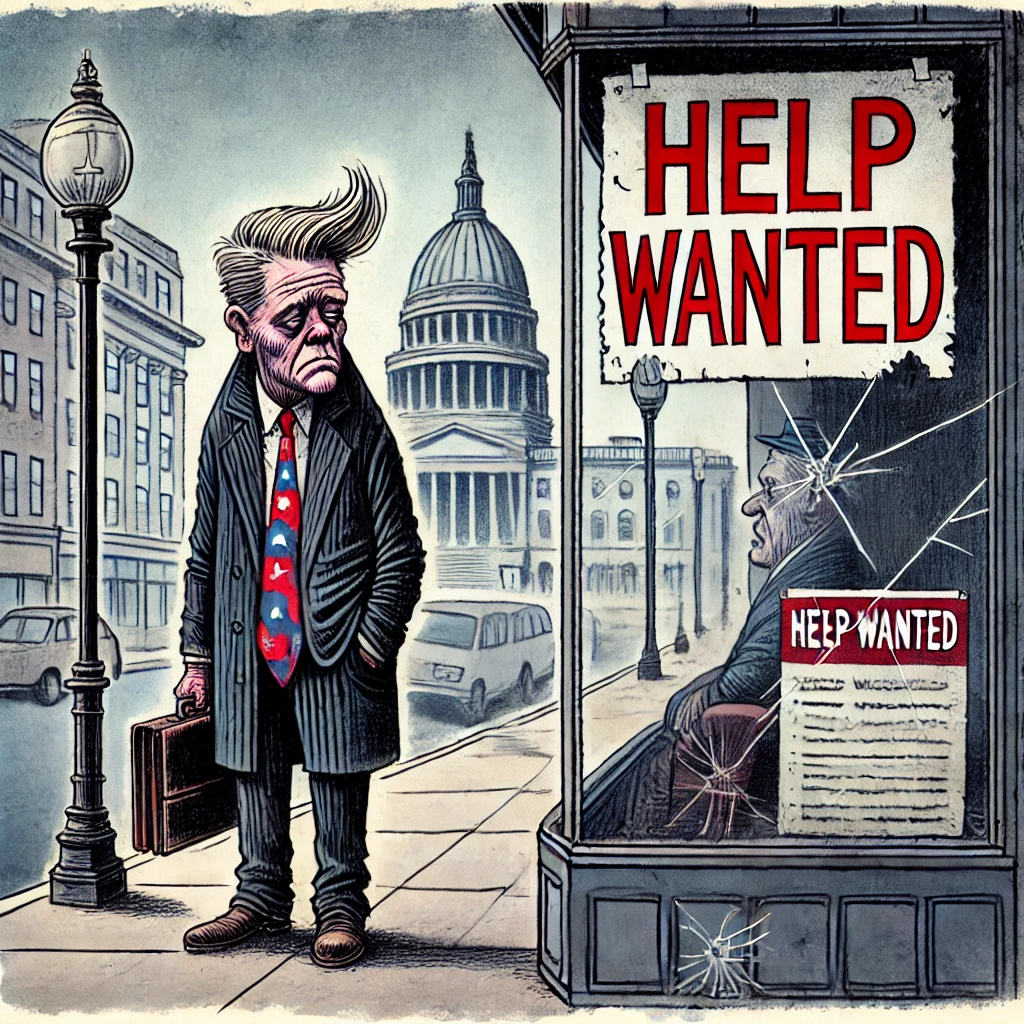How to Secure Your Next “Non-Political” Gig
Congratulations! You’ve managed to etch your names in the annals of political infamy by voting for the continuing resolution on the budget—a decision so monumentally misguided that it effectively tramples on Social Security, the very safety net earned by every hard-working American. If you’re reading this, you’re probably reeling from the realization that your careers in public service are now as viable as a used car with a busted engine. Lucky for you, we’ve put together a step-by-step guide on how to reinvent yourselves as regular citizens—after all, there’s no way anyone would want to hire a career politician who voted against the future of Social Security.
1. Embrace the Reality: You’re Out
First things first: acknowledge the obvious. That vote wasn’t a strategic maneuver; it was a spectacular display of self-interest at the expense of every working American. Now that you’ve effectively doomed your political careers, it’s time to accept your new reality. The sooner you come to grips with your impending exit from the political arena, the faster you can focus on preparing your resumes for a career outside of Washington’s echo chambers.
2. Dust Off That Resume
Your resume is about to become your best friend—unlike your political record, which will be remembered as a cautionary tale of hubris and short-sightedness. Start by stripping away all the accolades and pompous titles you once cherished. Instead, focus on transferable skills like negotiation, public speaking, and the art of saying nothing when it matters. But be careful: potential employers might not be thrilled to learn about your vote on Social Security. When crafting your resume, consider these points:
- Keep It Generic: Avoid mentioning specific policy decisions that have now become a career-killing liability. Instead, emphasize your “experience in public administration” and “ability to work under pressure,” while glossing over the details of that infamous vote.
- Highlight Soft Skills: Shift focus to your communication and crisis management skills. After all, managing the fallout of a failed budget resolution does require a certain level of crisis savvy—even if it was ultimately self-inflicted.
- Tailor Your Language: Avoid buzzwords that might ring alarm bells. Steer clear of terms like “fiscal responsibility” or “bipartisan cooperation” unless you’re sure the prospective employer doesn’t have a moral objection to Social Security dismantlers.
3. Gathering References: Who’s Left to Vouch for You?
In the current climate, finding references willing to overlook your flagrant disregard for the working class might seem like searching for unicorns. However, not everyone will recall your pivotal mistake with the same level of scorn. Consider reaching out to:
- Former Colleagues: Those who were forced to work alongside you might now see your actions as a learning experience rather than a defining career moment. A well-worded reference from a sympathetic coworker could help bridge the gap between your political mishap and your potential in a new industry.
- Industry Experts: Try to connect with experts outside the political arena who can attest to your administrative competencies. Even if they don’t entirely agree with your policy choices, they might recognize your talent in negotiation or organizational management.
- Networking Events: Attend industry meetups, professional conferences, and public forums where you can start fresh. Nothing says “new beginning” like a robust LinkedIn profile filled with endorsements from non-political professionals.
Remember, when asking for references, lead with humility. Acknowledge that while you may have made a grave error in judgment, you’ve learned—albeit the hard way—and are committed to contributing positively in your next role. If necessary, prepare a rehearsed explanation that deflects blame while promising future reform. (After all, who wouldn’t want to hire a “reformed” politician with firsthand experience in crisis management?)
4. Polishing Your Online Presence
Your digital footprint is likely already marred by scathing headlines and endless memes mocking your political misstep. It’s time to reinvent your online persona. Begin by:
- Updating Social Media Profiles: Create a new narrative that centers on growth, accountability, and forward-thinking vision. Consider using phrases like “renewed focus on service” or “dedicated to pragmatic problem-solving.”
- Crafting a Personal Website: Showcase your professional achievements that aren’t overshadowed by your political legacy. Provide evidence of your skills through blog posts, case studies, and thought leadership pieces that focus on constructive contributions rather than the toxic politics of the past.
- Engaging in Public Discourse: Start engaging in conversations that highlight your expertise in areas like policy analysis, project management, or community outreach. Keep your tone professional and steer clear of incendiary rhetoric that could further alienate potential employers.
5. Interview Tactics: Turning Liability into a Lesson Learned
Interviews are your golden opportunity to reframe your narrative. When inevitably questioned about your vote, be prepared with a carefully crafted response. Here are some strategies:
- Emphasize Learning: Acknowledge that the decision was a mistake—a miscalculation driven by political expediency rather than genuine conviction. Stress that you’ve since gained valuable insights into the importance of safeguarding public welfare, even if it cost you your political career.
- Focus on Skills: Shift the conversation away from political ideology and towards your ability to manage complex crises, lead teams under duress, and negotiate in high-stakes environments. These are all valuable skills in the private sector.
- Express Genuine Regret: A heartfelt admission of error can go a long way. Explain that you now understand the broader implications of your actions and are committed to ensuring that such oversights never occur again. If you can convince a prospective employer that you’re sincere, they might overlook your past transgressions in favor of your potential for future contributions.
6. Leverage Your Network: From Washington to the Real World
Your years in Congress have undoubtedly given you access to a network of influential figures—though not many may want to associate with your legacy now. Nevertheless, some connections might still prove beneficial. Reach out to:
- Former Staffers: They know your work ethic from behind the scenes. Their testimonials about your ability to manage a team might help offset the political baggage you carry.
- Industry Contacts: Attend seminars and workshops where former colleagues, lobbyists turned consultants, and think-tank fellows gather. Use these opportunities to rebuild your reputation as a seasoned professional who, despite a disastrous vote, possesses invaluable insights into public policy and administration.
- Mentors in the Private Sector: Seek guidance from respected figures outside politics who can help you navigate the transition. A mentor’s endorsement might just be the seal of approval you need to make a convincing case for your new career path.
7. Keep It Humble, Keep It Real
While it might be tempting to double down on defiant rhetoric or dismissive sarcasm during your job search, remember that humility can be a potent tool in winning over skeptical employers. Yes, your vote was a public spectacle of self-interest, and yes, it has now painted you as an out-of-touch relic of political misadventure. However, the private sector often values the ability to learn from one’s mistakes. Demonstrate that you’re not the callous politician you once were; instead, present yourself as a reformed professional who has taken a hard look at the consequences of your actions and is ready to move forward with newfound wisdom.
Final Thoughts: The Future Awaits—If You Dare to Change
It’s time to pack up your political career, polish your resume, and prepare for the uphill battle of convincing employers that you’re more than just a symbol of bureaucratic betrayal. In the end, your future job may not be as glamorous as your former seat in Congress, but at least it will be built on a foundation of accountability, resilience, and a genuine commitment to serving the people—this time, in a way that doesn’t trample on their hard-earned security.
So, take a long, hard look in the mirror and admit that you’ve burned your bridges with the American public. Use that fiery moment as motivation to rebuild your professional life from scratch. Gather your references, sharpen your interview tactics, and let your resume reflect the lessons learned from a monumental mistake. The road ahead is fraught with challenges, but perhaps this painful episode will be the catalyst for a transformation that, one day, might even earn you a sliver of respect—if not in the halls of Congress, then at least in the competitive arena of the private sector.
Best of luck, former lawmakers. May your job search be as relentless and unforgiving as the public’s judgment, and may you finally discover that there is indeed no room for self-serving politicos in a society that values integrity, accountability, and the protection of every hardworking citizen’s future.




